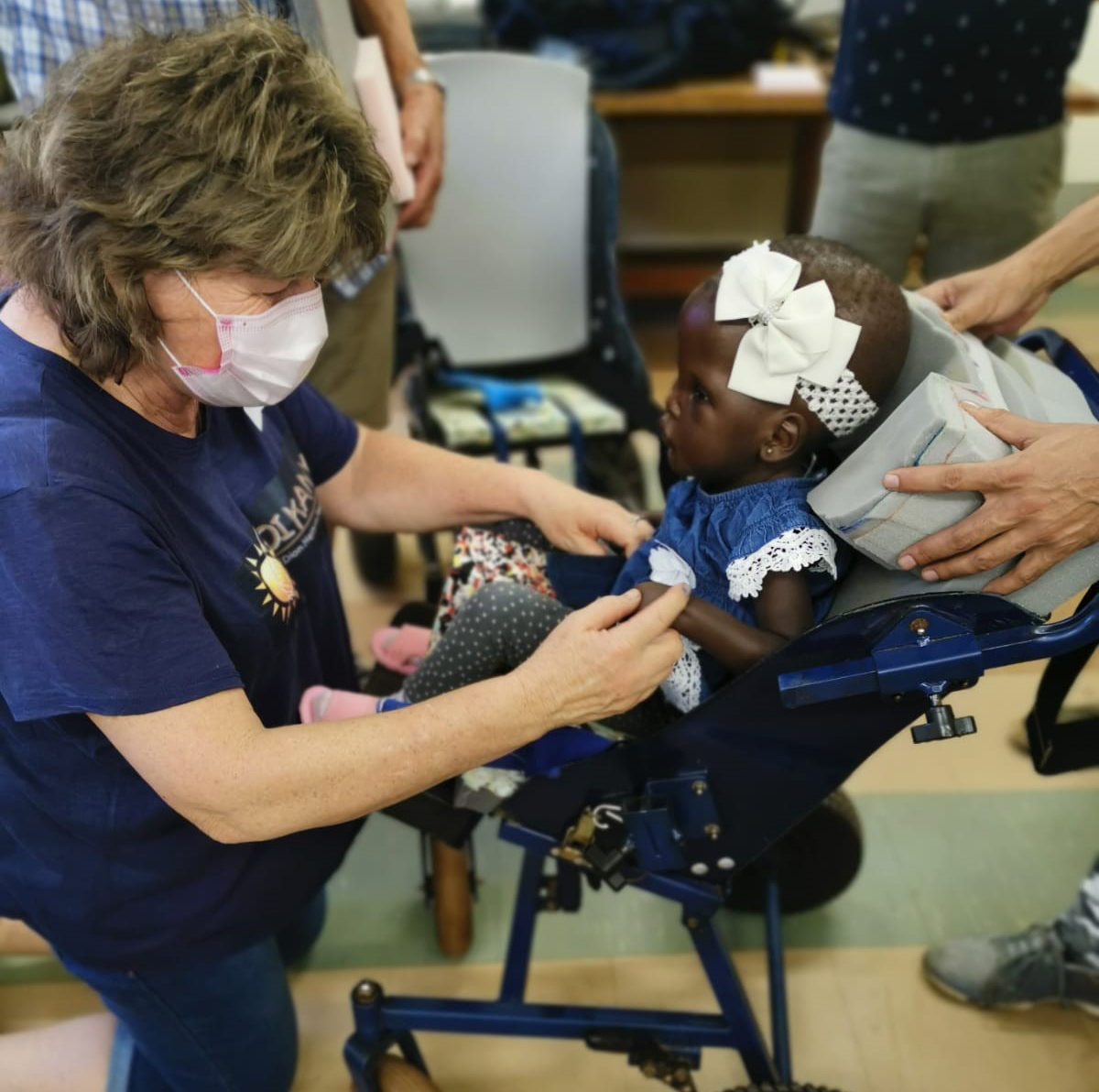click to dowload our latest edition
CLICK HERE TO SUBSCRIBE TO OUR NEWSLETTER


Published
2 years agoon
Marilyn Bassin has dedicated her life to bettering the lives of indigent children, so she didn’t mind spending the past six months repairing stinking, rat-eaten wheelchairs because they enable children with cerebral palsy to live their best possible life.
This “veteran children’s-rights activist”, as the Daily Maverick has dubbed Bassin, went to Thohoyandou and Venda in Limpopo on the first weekend of November 2021 to fit the children into her freshened up wheelchairs, known as buggies.
“Their response was the most unbelievable thing,” says Bassin, a physiotherapist working in Protea South squatter camp in Soweto. “They laugh and smile knowing they are going to be able to sit up for the first time ever.”
She says a lot of them die waiting, having been unable to obtain a buggy for a few years. “Their mothers are my absolute best. They just say, ‘G-d bless you!’ so many times, and they sit from early in the morning until five o’clock, knowing they’re getting this prized possession.”
Bassin, self-described as an “eternal optimist” and labelled as a “truly selfless individual” by the King David Schools’ Foundation, learnt about destitute people living deep in rural areas when she was handing out e’Pap last year. By then, she had met Dr Coenie Louw, who looks after thousands of starving children in Limpopo. Meanwhile, Jerry Bernardo was making tray tables and footplates for buggies. “I promised Jerry that he was going to come with me in June to the rural areas and hand out buggies,” recalls Bassin.
Sadly, Bernardo contracted COVID-19 and died a week before that was meant to happen. “While I was watching Jerry’s funeral on Zoom, Coenie told me his brother had died of COVID-19. I told him, ‘Let’s do a massive intervention in their names in your area. Let’s honour your brother, you, and Jerry for the work you’ve all done.’ So, we’ve taken buggies to four places, with Thohoyandou and Venda the latest and the biggest. It was by far the most preparation – six months of back-breaking work.”
It takes Bassin and her volunteers, including students from King David and members of Rosebank Rotary Club, 40 minutes to rehabilitate one buggy. “We strip it down totally. We pull off its revolting foam, which stinks. Picking off that foam is hell because it’s stuck for life. We wash it down. You can do it depending on your nails and also how many times people have stuck onto it.”
Bassin has been working with buggies since 2009 because of her interest in cerebral palsy children. “I have made contacts along the way, including with a non-governmental organisation [NGO] called the Paige Project, which goes from hospital to hospital in Gauteng and collects unusable buggies. I’ve even gone round to collect from all [sorts of] weird and wonderful places for this NGO. I now collect them by the 20s because a wheelchair like this is mandatory if you have cerebral palsy.”
Bassin explains the condition by moving her arms and legs animatedly while saying, “Your hands are like this, your feet do this, your one foot doesn’t bend.”
Fitting a child into a buggy takes about two hours, and she has done it in hospitals, clinics, NGOs with cerebral palsy children, and in rural areas.
The latter are closest to her heart partly because “they get nothing, and all their COVID-19 grants were stolen”.
Asked why they don’t complain, Bassin puts her right hand through her brown hair and responds, “They’re not worldly people, and a lot of them aren’t South Africans. A lot of them don’t even have a birth certificate, so they aren’t going to raise a storm because they didn’t get things.”
Besides the buggies, Bassin also gave rattles to each child, which she made using tubes wrapped with shiny Christmas paper, with beads inside the stoppers on either end. “They love these toys because these children have such altered sensation, some of them can’t stand it when you touch them. One mother said, ‘I’ve never had such a toy.’ You look at her, and you realised that she probably never has.”
The buggies hold the children still, allowing them to do everything as well as they possibly can. “Although they can’t see, can’t form words, struggle to eat, and their eyes and tongue constantly move just like their limbs, they are highly intelligent and know exactly what’s going on. In a buggy, their neck and head are kept still enough for them to start speaking more and more understandably, and they can certainly eat better. It’s not that they die young because they’ve got so many problems. These children grow into divine teenagers. They just love any attention because they’re treated like idiots and they’re not. Without the buggies, they end up lying on the floor all day long, only seeing people’s feet. So, when you can put them in a chair like this, they become part of society. It is a mitzvah beyond anything you can imagine.”
Bassin also gave a buggy to a little girl who lives in a Hamakuya village, a remote place very close to the Zimbabwean border. “She’s being looked after by her grandmother who said afterwards, ‘May you just be blessed forever. May you only know goodness. Thank you for doing what you’ve just done.’ No one cares about them. They are literally forgotten people, and it’s wonderful to help them.”
Over this past year, Bassin has also been helping a Daily Maverick journalist to research missing children. “We’re still looking for a two-year-old boy who was trafficked by his father in Zimbabwe. I’ve been putting myself in a lot of danger trawling through squatter camps looking for his gangster father.”
